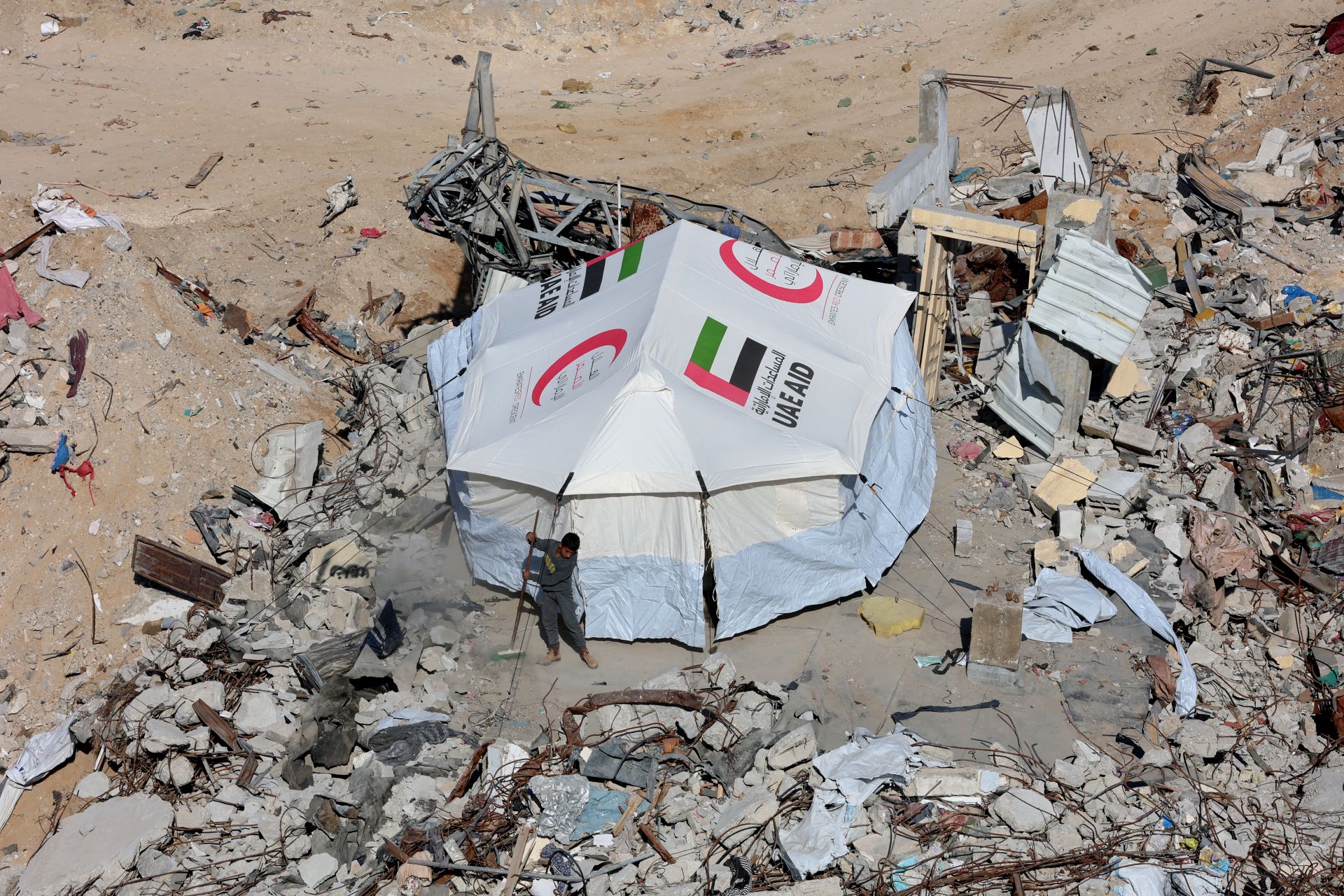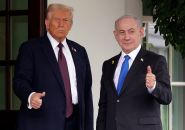- Home
- Middle East
- Fragile Gaza Ceasefire Fraught with Risks

A Palestinian boy sweeps in front of a newly erected tent set up near the rubble of houses as displaced people return to Jabalia in the northern Gaza Strip, on January 21, 2025, on the third day of a ceasefire deal in the war between Israel and Hamas. ©Omar AL-QATTAA / AFP
After months of negotiations, a ceasefire has paused the devastating war in Gaza, but it risks collapsing as a result of deep distrust between Israel and Hamas and the multi-phased nature of the deal.
Qatar, which mediated the talks along with the United States and Egypt, has expressed hope the six-week truce and hostage-prisoner exchange will become permanent.
However, that outcome is far from certain with the releases timetabled at a glacial pace in comparison to a previous truce agreement.
Further complicating the ceasefire is the fact that the text of the agreement has not been made public, raising risks of last-minute snags and differences in interpretation by the parties.
"Unfortunately, there is a high risk of the truce derailing and (Israeli Prime Minister Benjamin) Netanyahu continuing his military campaign in Gaza," Anna Jacobs, of the Arab Gulf States Institute in Washington, told AFP.
The ceasefire kicked off to a rocky start, with delays in both the beginning of the truce and the first swap of Israeli hostages and Palestinian prisoners when it went into effect on Sunday.
During a three-hour delay before the truce began, Gaza's civil defense agency said Israeli strikes killed eight people and wounded 25.
The ceasefire is being monitored by the mediators via an "operations room" in Cairo, Qatari foreign ministry spokesperson Majed al-Ansari told Al-Jazeera.
He said they are watching to see if the delicate terms of the deal are being implemented – including the entry of aid into Gaza, the prisoner and hostage exchanges, the withdrawal of Israeli troops from densely populated areas and the return of displaced Gazans to their homes.
'Diverging interpretations'
But Joost Hiltermann of the International Crisis Group said "success will depend also on the mediators serving as guarantors".
On Monday, newly inaugurated US President Donald Trump said he was "not sure" the ceasefire would last.
Hiltermann said "this pertains in particular to the US, given its weight. But we all know that Trump is unpredictable and has a very short attention span." "Will he seek to see the deal's implementation through or lose interest?" He also said the "the absence of a publicly available official text of the terms opens the possibility for widely diverging interpretations".
The ceasefire covers the cessation of hostilities for an initial six-week phase, during which 33 Israeli hostages are to be freed in exchange for 1,900 Palestinians being held in Israeli custody.
What comes next, however, will be trickier to see through.
The terms of a second phase, aimed at bringing about a permanent end to the war and the return of all the remaining living hostages to Israel, are to be ironed out.
"It is important to stress that the deal is a fragile truce not a cessation of the conflict," Sanam Vakil, director of the Chatham House think-tank's Middle East and North Africa Programme, wrote in an opinion piece.
"It will require continued monitoring and accountability from the negotiating parties. And there will need to be an almost immediate return to the negotiating table to keep the remaining phases alive."
'Immense' gap
The war was triggered by Hamas's October 7, 2023 attack on Israel, which resulted in the deaths of 1,210 people, mostly civilians, according to an AFP count based on official Israeli figures.
Israel's retaliatory campaign in Gaza has killed more than 47,000 people, also mostly civilians, according to the health ministry in the Hamas-ruled territory, whose figures are considered reliable by the UN.
Major disagreements between the two sides remain, including Israel's demand for Hamas to disarm, which the militant group is unlikely to accept.
Hamas, meanwhile, is demanding that Israel end its 17-year blockade of Gaza.
"The gap of trust between the two parties is immense," Michael Horowitz, head of intelligence at security and risk management consultancy Le Beck International, told AFP.
"The lack of transparency on the deal helps Netanyahu by allowing him to claim that this ceasefire is not permanent, and that Israel will be able to resume the war."
According to Jacobs, "Netanyahu hasn't met any of his strategic objectives in this war, notably the elimination of Hamas.
"So it is difficult to imagine that he will not find a pretext to sabotage the truce and continue the war."
Internal pressures are weighing on Netanyahu, who holds a narrow parliamentary majority with far-right coalition partners who oppose the truce.
In this scenario, it is uncertain whether Hamas will feel confident enough to hand over all the Israeli hostages without fear of further reprisals.
"The major question mark arises after the hostage release: will Netanyahu still honor the truce?" said Hussein Haridi, Egypt's former deputy foreign minister.
By Sofiane ALSAAR, AFP
Read more



Comments